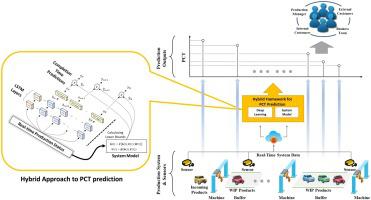当前位置:
X-MOL 学术
›
J. Manuf. Syst.
›
论文详情
Our official English website, www.x-mol.net, welcomes your feedback! (Note: you will need to create a separate account there.)
Product Completion Time Prediction Using A Hybrid Approach Combining Deep Learning and System Model
Journal of Manufacturing Systems ( IF 12.1 ) Pub Date : 2020-10-01 , DOI: 10.1016/j.jmsy.2020.10.006 Jing Huang , Qing Chang , Jorge Arinez
Journal of Manufacturing Systems ( IF 12.1 ) Pub Date : 2020-10-01 , DOI: 10.1016/j.jmsy.2020.10.006 Jing Huang , Qing Chang , Jorge Arinez

|
Abstract The prediction of product completion time is critical in real time production scheduling and control to achieve customer demand satisfaction. However, it is a challenging task due to the increasing complexity of production systems and greater diversity of products. The recent advancement in data-driven approach and machine learning algorithms have provided unprecedent opportunities to tackle such problems that otherwise very difficult to solve using conventional methods in the manufacturing industry. However, most existing studies on product completion time prediction adopt a purely data-driven approach while ignoring the prospect of integrating domain knowledge in their machine learning models. In this paper, we propose a hybrid approach to predicting product completion time by combining the strengths of both machine learning techniques and analytical system model. A mathematical model for multi-product serial production line is proposed to describe the real-time dynamics of the system. With this model, the strict lower bound of product completion time can be efficiently computed for given system status, where the lower bound represents the least possible product completion time when assuming no random downtime in the system. Instead of directly predicting the product completion time, a deep learning model is developed to only predict the distance between the lower bound and actual product completion time. Guided by properties of production system, we discover a recurrent sequence in the prediction problem by modeling each machine and product as recurrent units. The Long Short-Term Memory (LSTM) method, a prominent variant of recurrent neural network (RNN), is used to combine with the system model to predict the product completion time in a real-time fashion.
中文翻译:

使用结合深度学习和系统模型的混合方法预测产品完成时间
摘要 产品完成时间的预测是实时生产调度和控制以实现客户需求满意的关键。然而,由于生产系统的日益复杂和产品的多样性,这是一项具有挑战性的任务。数据驱动方法和机器学习算法的最新进展为解决此类问题提供了前所未有的机会,而这些问题在制造业中使用传统方法很难解决。然而,大多数现有的关于产品完成时间预测的研究都采用纯数据驱动的方法,而忽略了将领域知识集成到机器学习模型中的前景。在本文中,我们提出了一种混合方法,通过结合机器学习技术和分析系统模型的优势来预测产品完成时间。提出了多产品系列生产线的数学模型来描述系统的实时动态。使用该模型,可以针对给定的系统状态有效地计算产品完成时间的严格下限,其中下限表示假设系统中没有随机停机时间时可能的最短产品完成时间。不是直接预测产品完成时间,而是开发了深度学习模型来仅预测下限与实际产品完成时间之间的距离。以生产系统的特性为导向,我们通过将每台机器和产品建模为循环单元来发现预测问题中的循环序列。长短期记忆 (LSTM) 方法是循环神经网络 (RNN) 的一个突出变体,用于与系统模型相结合,以实时方式预测产品完成时间。
更新日期:2020-10-01
中文翻译:

使用结合深度学习和系统模型的混合方法预测产品完成时间
摘要 产品完成时间的预测是实时生产调度和控制以实现客户需求满意的关键。然而,由于生产系统的日益复杂和产品的多样性,这是一项具有挑战性的任务。数据驱动方法和机器学习算法的最新进展为解决此类问题提供了前所未有的机会,而这些问题在制造业中使用传统方法很难解决。然而,大多数现有的关于产品完成时间预测的研究都采用纯数据驱动的方法,而忽略了将领域知识集成到机器学习模型中的前景。在本文中,我们提出了一种混合方法,通过结合机器学习技术和分析系统模型的优势来预测产品完成时间。提出了多产品系列生产线的数学模型来描述系统的实时动态。使用该模型,可以针对给定的系统状态有效地计算产品完成时间的严格下限,其中下限表示假设系统中没有随机停机时间时可能的最短产品完成时间。不是直接预测产品完成时间,而是开发了深度学习模型来仅预测下限与实际产品完成时间之间的距离。以生产系统的特性为导向,我们通过将每台机器和产品建模为循环单元来发现预测问题中的循环序列。长短期记忆 (LSTM) 方法是循环神经网络 (RNN) 的一个突出变体,用于与系统模型相结合,以实时方式预测产品完成时间。



























 京公网安备 11010802027423号
京公网安备 11010802027423号